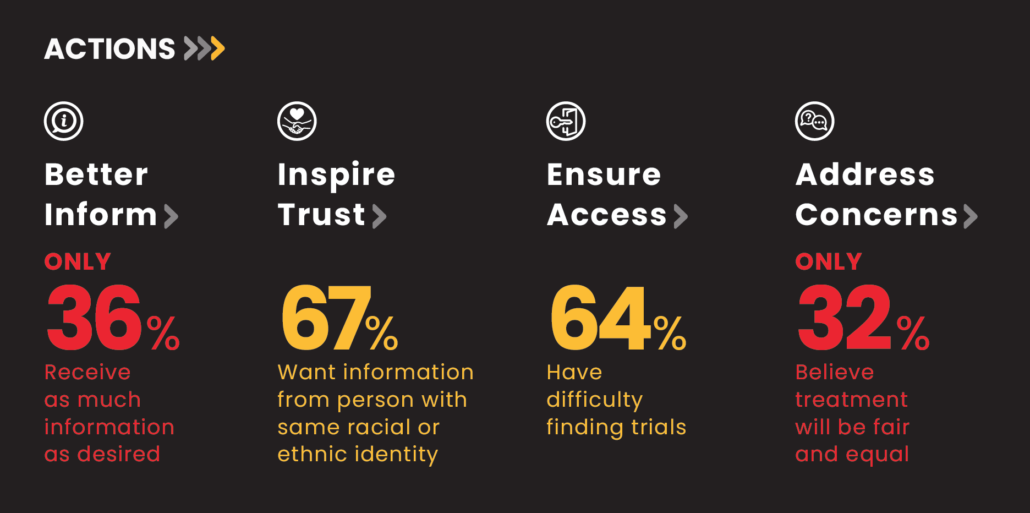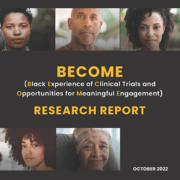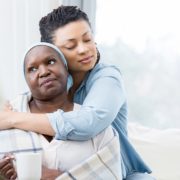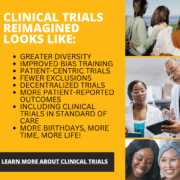MBCA Releases Full BECOME Research Report on Black Experience of Clinical Trials
The most affected. The least protected.
This is a reality that Black people in America face daily across multiple disease states, and that is undeniably highlighted in cancer patients. By partnering with patients, researchers, nonprofits, and the pharmaceutical and biotech industry, the Metastatic Breast Cancer Alliance is working to change that.
Among racial and ethnic groups in the U.S., Black women and men have the highest death rate and shortest survival for many cancers, including breast cancer. Even more disturbing, these numbers haven’t shifted in the past twenty years. Though causation of these statistics is multi-faceted, participation in clinical trials can help improve outcomes and survival. About 15% of cancer patients in the U.S. are Black, yet Black patients make up only 4% to 6% of clinical trial participants. This is not an accurate reflection of diversity in the population.
This is why the Alliance’s BECOME research initiative was created.
Identifying opportunities to increase Black participation in clinical trials
BECOME stands for Black Experience Of Clinical Trials And Opportunities For Meaningful Engagement. Patient-led, results-driven, and action-focused, the BECOME research project aims to increase access to clinical trials in Black communities. Using real-life patient input and results from surveying 424 respondents, BECOME aims to inform practical and actionable methods to make it easier for Black people living with MBC to take part in research trials.
This summer, the project was featured at the 2022 American Society of Clinical Oncology (ASCO) Annual Meeting, reaching about 40,000 oncology professionals with key insights gathered to date.
The Alliance is now ready to share its full research findings and action items with the world.

Stephanie Walker, Project Lead, Patient Advocate Living with MBC
“We are so excited to complete this segment of the survey so we can begin implementing the action steps needed to implement real change,” says Stephanie Walker, a patient advocate and MBC survivor who is project lead for the BECOME research initiative. “Some of the results of the BECOME survey were expected, but some were quite surprising. One of the most interesting findings was the fact that if simply asked, 80% of Black people would consider participation in clinical trials. That number was higher than expected, and showed us that most Black patients aren’t even asked or offered to participate in a clinical trial.”
There were other unexpected results:
- 92% of Black patients are interested in learning about clinical trials, but only 54% of Black patients are aware of clinical trials happening in MBC.
- Some key concerns Black survey respondents expressed about participating in clinical trials were expense, logistics, and difficulty finding trials.
- Black patients were more likely than non-Black patients to want to learn about clinical trials from someone with shared experience.
The web-based survey analyzed U.S. adults living with MBC, following a literature review and Key Informant interviews. Survey participants were recruited through social media posts and emails—from the Alliance, its members, subcommittee members and ambassadors—to people connected with cancer communities.
The results focused primarily on 102 respondents who self-identified as Black, and also included some comparison with responses from non-Black participants from the full pool of 424 respondents. Participants tended to be well-educated, have a relatively high socioeconomic status, receive care through an academic medical center, and be well-insured.
Taking the next steps to drive change
The BECOME project team believes these findings will highlight current barriers to clinical trial participation in a healthcare system that is still in dire need of reform, restructure, and tangible methods to provide more equitable care.
The just-released full research report identifies four areas of focus for healthcare professionals, nonprofits and advocates to begin making change: by better informing Black patients, by inspiring trust, by ensuring access to clinical trials and by addressing concerns.

As a next step to leverage this research, the Alliance is partnering with other organizations doing similar work to develop the Black Wo(Men) Speak Symposium, which will be presented in December 2022 in conjunction with the San Antonio Breast Cancer Symposium. The event aims to shine a light on the urgent need for greater diversity in clinical trials by presenting data gathered from four recent research surveys.
“Living in Louisiana, I had no idea the disparities in unequal care, based on the zip code,” says Walker. “People of color living in rural areas, disconnected from the internet and social media, have no idea what they are entitled to from health care providers. Meanwhile, the numbers are not changing. We are excited that these findings have actionable steps that may empower us to know what we need. If we move the needle a hair, we are doing our job.”
Visit the BECOME project page to read and download the full research report.






